Depression Management: Social Approaches and Community Development
VerifiedAdded on 2022/12/19
|19
|5116
|74
Essay
AI Summary
This assignment delves into the management of depression through social approaches and community development. It begins by defining depression as a prevalent mental health disorder, highlighting its global impact and prevalence in the UK, emphasizing the need for a comprehensive approach beyond biomedical models. The essay explores the social determinants of depression, including stressful life experiences, financial hardships, substance abuse, and social isolation. It then introduces the principles and practices of community development, focusing on empowerment, human rights, and inclusion. The assignment outlines strategies for managing depression, such as raising community awareness, advocating for social change, and implementing screening initiatives and healthcare services. It emphasizes the importance of community involvement in addressing the causes and consequences of depression, aiming for a more informed and supportive environment. The essay concludes by advocating for the development of community-led programs to combat the social causes of depression.
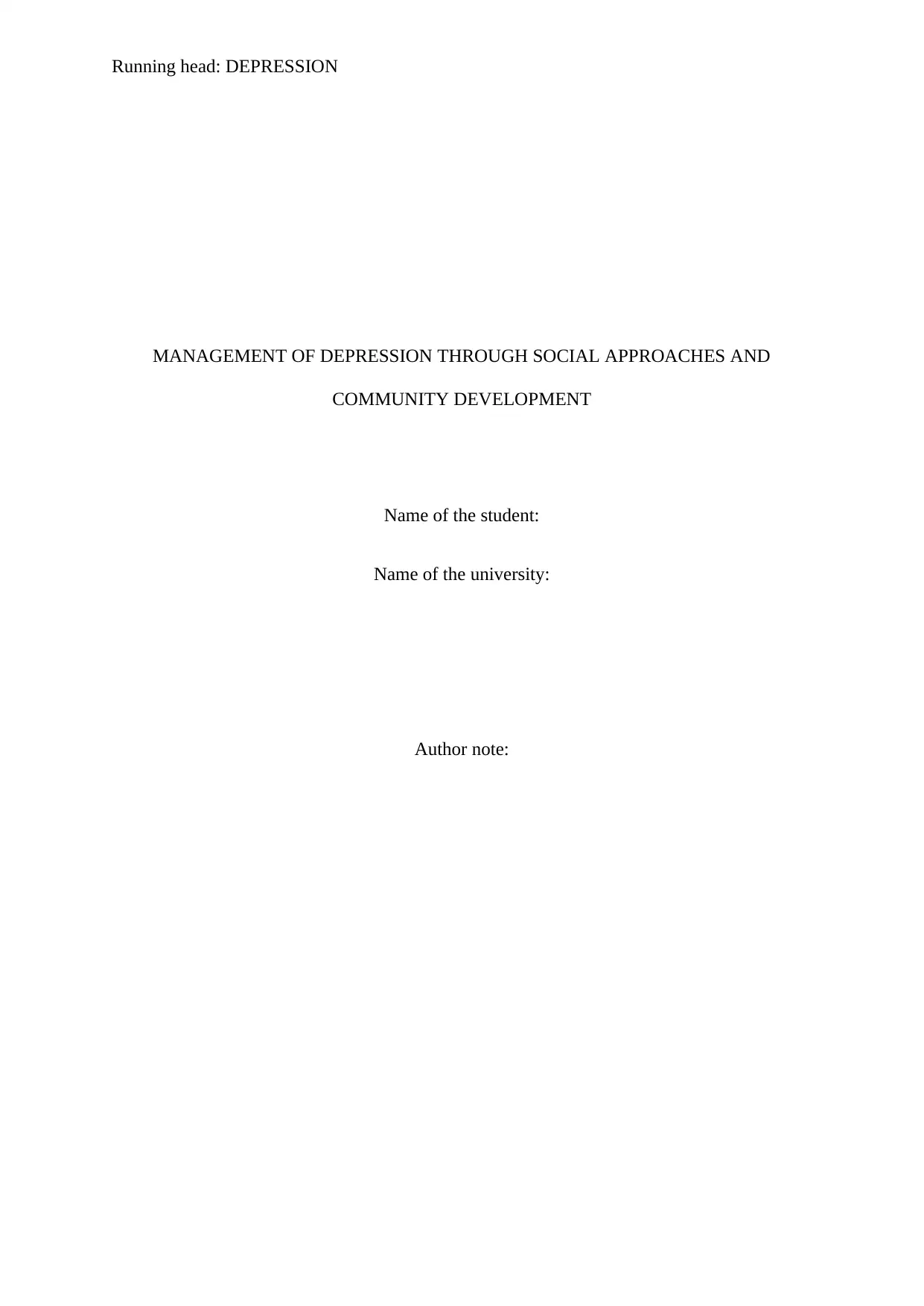
Running head: DEPRESSION
MANAGEMENT OF DEPRESSION THROUGH SOCIAL APPROACHES AND
COMMUNITY DEVELOPMENT
Name of the student:
Name of the university:
Author note:
MANAGEMENT OF DEPRESSION THROUGH SOCIAL APPROACHES AND
COMMUNITY DEVELOPMENT
Name of the student:
Name of the university:
Author note:
Paraphrase This Document
Need a fresh take? Get an instant paraphrase of this document with our AI Paraphraser
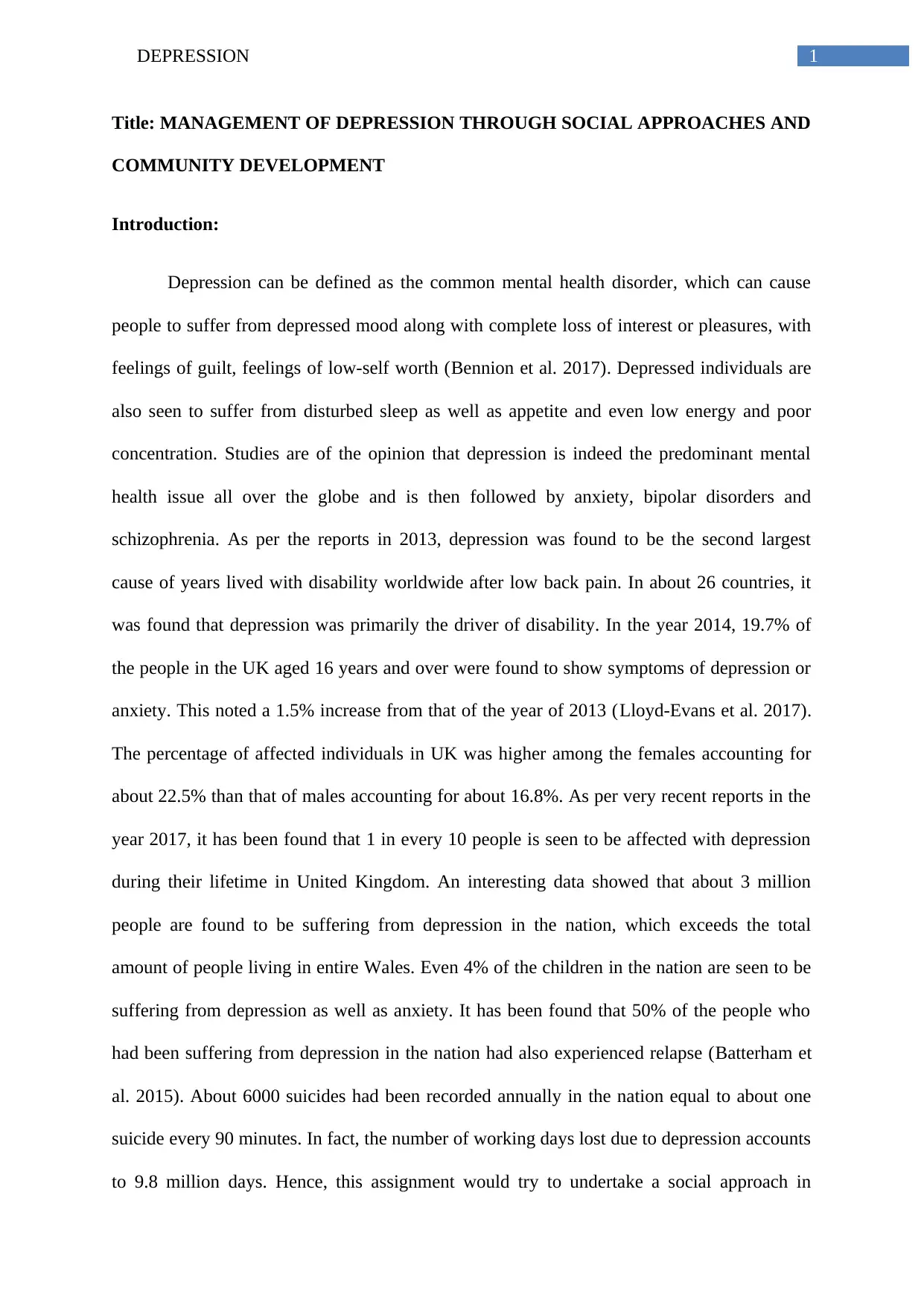
1DEPRESSION
Title: MANAGEMENT OF DEPRESSION THROUGH SOCIAL APPROACHES AND
COMMUNITY DEVELOPMENT
Introduction:
Depression can be defined as the common mental health disorder, which can cause
people to suffer from depressed mood along with complete loss of interest or pleasures, with
feelings of guilt, feelings of low-self worth (Bennion et al. 2017). Depressed individuals are
also seen to suffer from disturbed sleep as well as appetite and even low energy and poor
concentration. Studies are of the opinion that depression is indeed the predominant mental
health issue all over the globe and is then followed by anxiety, bipolar disorders and
schizophrenia. As per the reports in 2013, depression was found to be the second largest
cause of years lived with disability worldwide after low back pain. In about 26 countries, it
was found that depression was primarily the driver of disability. In the year 2014, 19.7% of
the people in the UK aged 16 years and over were found to show symptoms of depression or
anxiety. This noted a 1.5% increase from that of the year of 2013 (Lloyd-Evans et al. 2017).
The percentage of affected individuals in UK was higher among the females accounting for
about 22.5% than that of males accounting for about 16.8%. As per very recent reports in the
year 2017, it has been found that 1 in every 10 people is seen to be affected with depression
during their lifetime in United Kingdom. An interesting data showed that about 3 million
people are found to be suffering from depression in the nation, which exceeds the total
amount of people living in entire Wales. Even 4% of the children in the nation are seen to be
suffering from depression as well as anxiety. It has been found that 50% of the people who
had been suffering from depression in the nation had also experienced relapse (Batterham et
al. 2015). About 6000 suicides had been recorded annually in the nation equal to about one
suicide every 90 minutes. In fact, the number of working days lost due to depression accounts
to 9.8 million days. Hence, this assignment would try to undertake a social approach in
Title: MANAGEMENT OF DEPRESSION THROUGH SOCIAL APPROACHES AND
COMMUNITY DEVELOPMENT
Introduction:
Depression can be defined as the common mental health disorder, which can cause
people to suffer from depressed mood along with complete loss of interest or pleasures, with
feelings of guilt, feelings of low-self worth (Bennion et al. 2017). Depressed individuals are
also seen to suffer from disturbed sleep as well as appetite and even low energy and poor
concentration. Studies are of the opinion that depression is indeed the predominant mental
health issue all over the globe and is then followed by anxiety, bipolar disorders and
schizophrenia. As per the reports in 2013, depression was found to be the second largest
cause of years lived with disability worldwide after low back pain. In about 26 countries, it
was found that depression was primarily the driver of disability. In the year 2014, 19.7% of
the people in the UK aged 16 years and over were found to show symptoms of depression or
anxiety. This noted a 1.5% increase from that of the year of 2013 (Lloyd-Evans et al. 2017).
The percentage of affected individuals in UK was higher among the females accounting for
about 22.5% than that of males accounting for about 16.8%. As per very recent reports in the
year 2017, it has been found that 1 in every 10 people is seen to be affected with depression
during their lifetime in United Kingdom. An interesting data showed that about 3 million
people are found to be suffering from depression in the nation, which exceeds the total
amount of people living in entire Wales. Even 4% of the children in the nation are seen to be
suffering from depression as well as anxiety. It has been found that 50% of the people who
had been suffering from depression in the nation had also experienced relapse (Batterham et
al. 2015). About 6000 suicides had been recorded annually in the nation equal to about one
suicide every 90 minutes. In fact, the number of working days lost due to depression accounts
to 9.8 million days. Hence, this assignment would try to undertake a social approach in
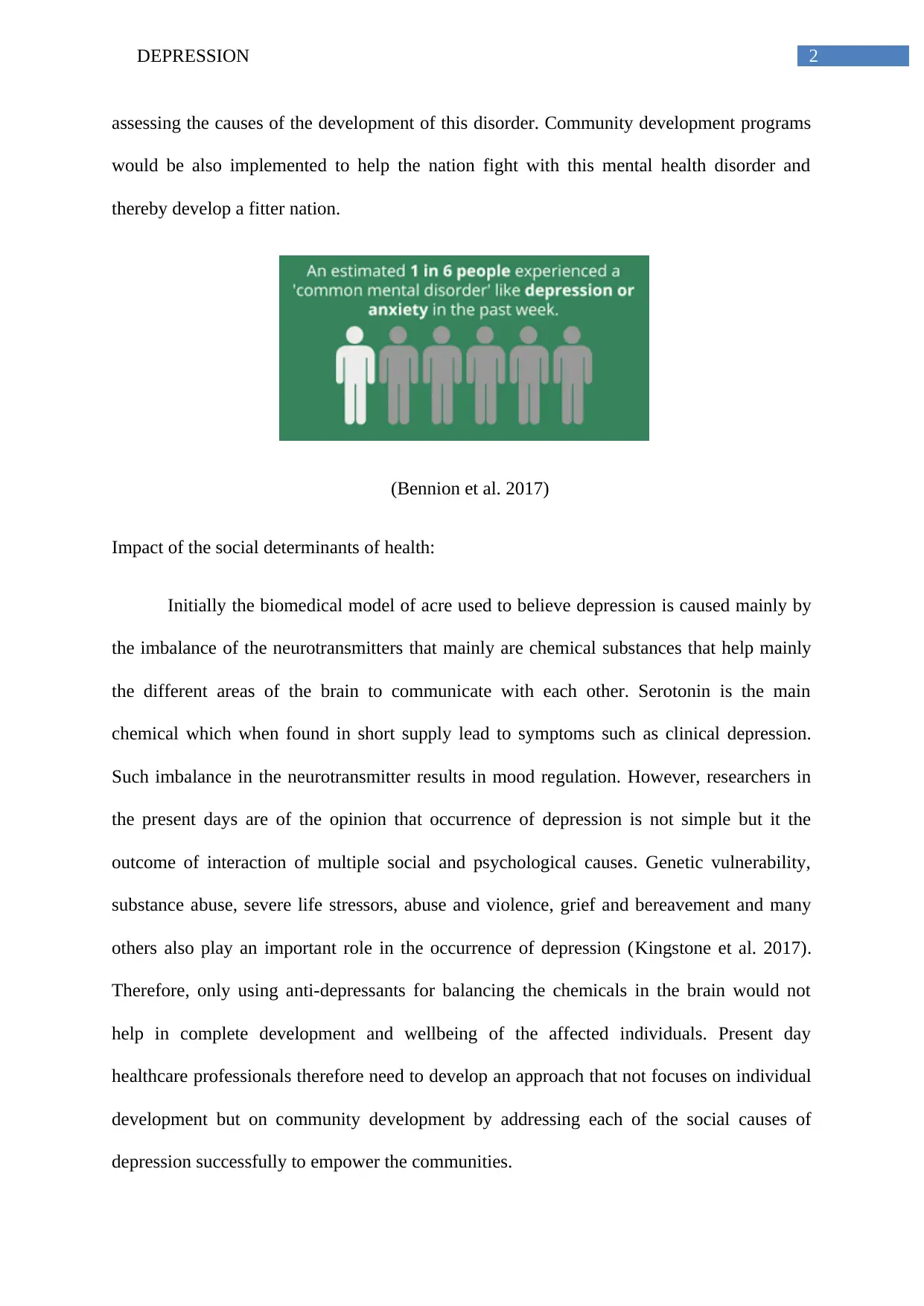
2DEPRESSION
assessing the causes of the development of this disorder. Community development programs
would be also implemented to help the nation fight with this mental health disorder and
thereby develop a fitter nation.
(Bennion et al. 2017)
Impact of the social determinants of health:
Initially the biomedical model of acre used to believe depression is caused mainly by
the imbalance of the neurotransmitters that mainly are chemical substances that help mainly
the different areas of the brain to communicate with each other. Serotonin is the main
chemical which when found in short supply lead to symptoms such as clinical depression.
Such imbalance in the neurotransmitter results in mood regulation. However, researchers in
the present days are of the opinion that occurrence of depression is not simple but it the
outcome of interaction of multiple social and psychological causes. Genetic vulnerability,
substance abuse, severe life stressors, abuse and violence, grief and bereavement and many
others also play an important role in the occurrence of depression (Kingstone et al. 2017).
Therefore, only using anti-depressants for balancing the chemicals in the brain would not
help in complete development and wellbeing of the affected individuals. Present day
healthcare professionals therefore need to develop an approach that not focuses on individual
development but on community development by addressing each of the social causes of
depression successfully to empower the communities.
assessing the causes of the development of this disorder. Community development programs
would be also implemented to help the nation fight with this mental health disorder and
thereby develop a fitter nation.
(Bennion et al. 2017)
Impact of the social determinants of health:
Initially the biomedical model of acre used to believe depression is caused mainly by
the imbalance of the neurotransmitters that mainly are chemical substances that help mainly
the different areas of the brain to communicate with each other. Serotonin is the main
chemical which when found in short supply lead to symptoms such as clinical depression.
Such imbalance in the neurotransmitter results in mood regulation. However, researchers in
the present days are of the opinion that occurrence of depression is not simple but it the
outcome of interaction of multiple social and psychological causes. Genetic vulnerability,
substance abuse, severe life stressors, abuse and violence, grief and bereavement and many
others also play an important role in the occurrence of depression (Kingstone et al. 2017).
Therefore, only using anti-depressants for balancing the chemicals in the brain would not
help in complete development and wellbeing of the affected individuals. Present day
healthcare professionals therefore need to develop an approach that not focuses on individual
development but on community development by addressing each of the social causes of
depression successfully to empower the communities.
⊘ This is a preview!⊘
Do you want full access?
Subscribe today to unlock all pages.

Trusted by 1+ million students worldwide
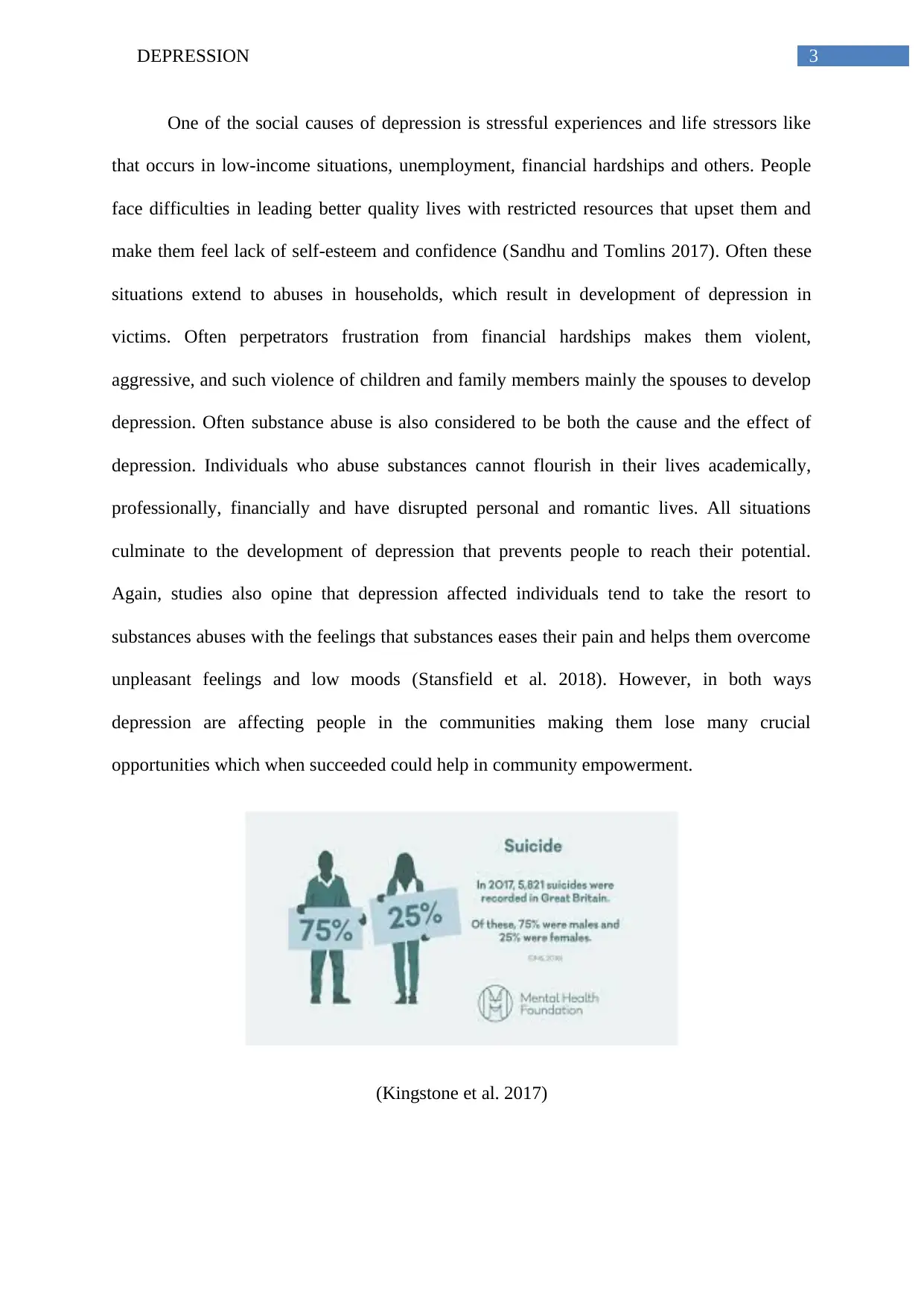
3DEPRESSION
One of the social causes of depression is stressful experiences and life stressors like
that occurs in low-income situations, unemployment, financial hardships and others. People
face difficulties in leading better quality lives with restricted resources that upset them and
make them feel lack of self-esteem and confidence (Sandhu and Tomlins 2017). Often these
situations extend to abuses in households, which result in development of depression in
victims. Often perpetrators frustration from financial hardships makes them violent,
aggressive, and such violence of children and family members mainly the spouses to develop
depression. Often substance abuse is also considered to be both the cause and the effect of
depression. Individuals who abuse substances cannot flourish in their lives academically,
professionally, financially and have disrupted personal and romantic lives. All situations
culminate to the development of depression that prevents people to reach their potential.
Again, studies also opine that depression affected individuals tend to take the resort to
substances abuses with the feelings that substances eases their pain and helps them overcome
unpleasant feelings and low moods (Stansfield et al. 2018). However, in both ways
depression are affecting people in the communities making them lose many crucial
opportunities which when succeeded could help in community empowerment.
(Kingstone et al. 2017)
One of the social causes of depression is stressful experiences and life stressors like
that occurs in low-income situations, unemployment, financial hardships and others. People
face difficulties in leading better quality lives with restricted resources that upset them and
make them feel lack of self-esteem and confidence (Sandhu and Tomlins 2017). Often these
situations extend to abuses in households, which result in development of depression in
victims. Often perpetrators frustration from financial hardships makes them violent,
aggressive, and such violence of children and family members mainly the spouses to develop
depression. Often substance abuse is also considered to be both the cause and the effect of
depression. Individuals who abuse substances cannot flourish in their lives academically,
professionally, financially and have disrupted personal and romantic lives. All situations
culminate to the development of depression that prevents people to reach their potential.
Again, studies also opine that depression affected individuals tend to take the resort to
substances abuses with the feelings that substances eases their pain and helps them overcome
unpleasant feelings and low moods (Stansfield et al. 2018). However, in both ways
depression are affecting people in the communities making them lose many crucial
opportunities which when succeeded could help in community empowerment.
(Kingstone et al. 2017)
Paraphrase This Document
Need a fresh take? Get an instant paraphrase of this document with our AI Paraphraser
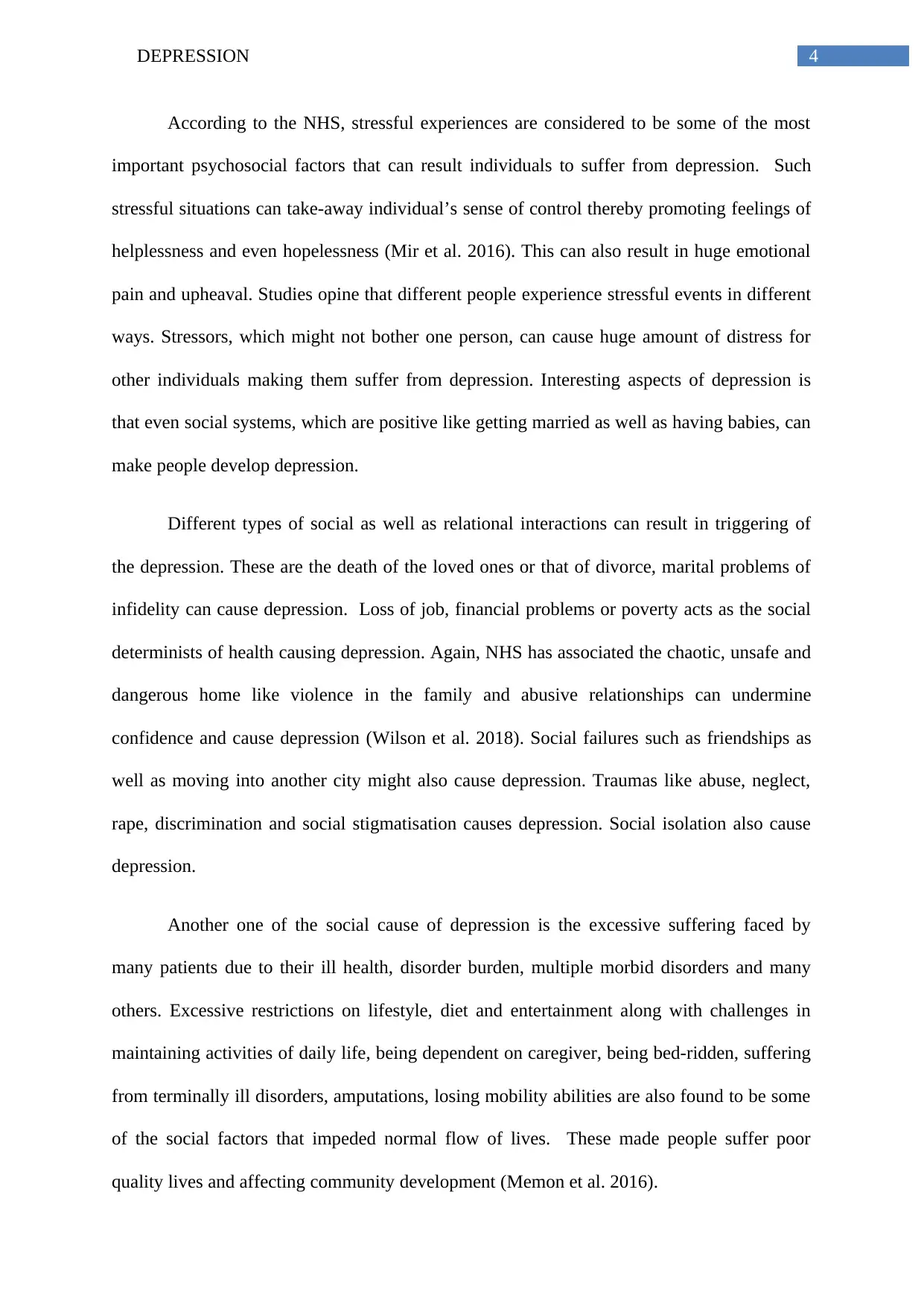
4DEPRESSION
According to the NHS, stressful experiences are considered to be some of the most
important psychosocial factors that can result individuals to suffer from depression. Such
stressful situations can take-away individual’s sense of control thereby promoting feelings of
helplessness and even hopelessness (Mir et al. 2016). This can also result in huge emotional
pain and upheaval. Studies opine that different people experience stressful events in different
ways. Stressors, which might not bother one person, can cause huge amount of distress for
other individuals making them suffer from depression. Interesting aspects of depression is
that even social systems, which are positive like getting married as well as having babies, can
make people develop depression.
Different types of social as well as relational interactions can result in triggering of
the depression. These are the death of the loved ones or that of divorce, marital problems of
infidelity can cause depression. Loss of job, financial problems or poverty acts as the social
determinists of health causing depression. Again, NHS has associated the chaotic, unsafe and
dangerous home like violence in the family and abusive relationships can undermine
confidence and cause depression (Wilson et al. 2018). Social failures such as friendships as
well as moving into another city might also cause depression. Traumas like abuse, neglect,
rape, discrimination and social stigmatisation causes depression. Social isolation also cause
depression.
Another one of the social cause of depression is the excessive suffering faced by
many patients due to their ill health, disorder burden, multiple morbid disorders and many
others. Excessive restrictions on lifestyle, diet and entertainment along with challenges in
maintaining activities of daily life, being dependent on caregiver, being bed-ridden, suffering
from terminally ill disorders, amputations, losing mobility abilities are also found to be some
of the social factors that impeded normal flow of lives. These made people suffer poor
quality lives and affecting community development (Memon et al. 2016).
According to the NHS, stressful experiences are considered to be some of the most
important psychosocial factors that can result individuals to suffer from depression. Such
stressful situations can take-away individual’s sense of control thereby promoting feelings of
helplessness and even hopelessness (Mir et al. 2016). This can also result in huge emotional
pain and upheaval. Studies opine that different people experience stressful events in different
ways. Stressors, which might not bother one person, can cause huge amount of distress for
other individuals making them suffer from depression. Interesting aspects of depression is
that even social systems, which are positive like getting married as well as having babies, can
make people develop depression.
Different types of social as well as relational interactions can result in triggering of
the depression. These are the death of the loved ones or that of divorce, marital problems of
infidelity can cause depression. Loss of job, financial problems or poverty acts as the social
determinists of health causing depression. Again, NHS has associated the chaotic, unsafe and
dangerous home like violence in the family and abusive relationships can undermine
confidence and cause depression (Wilson et al. 2018). Social failures such as friendships as
well as moving into another city might also cause depression. Traumas like abuse, neglect,
rape, discrimination and social stigmatisation causes depression. Social isolation also cause
depression.
Another one of the social cause of depression is the excessive suffering faced by
many patients due to their ill health, disorder burden, multiple morbid disorders and many
others. Excessive restrictions on lifestyle, diet and entertainment along with challenges in
maintaining activities of daily life, being dependent on caregiver, being bed-ridden, suffering
from terminally ill disorders, amputations, losing mobility abilities are also found to be some
of the social factors that impeded normal flow of lives. These made people suffer poor
quality lives and affecting community development (Memon et al. 2016).
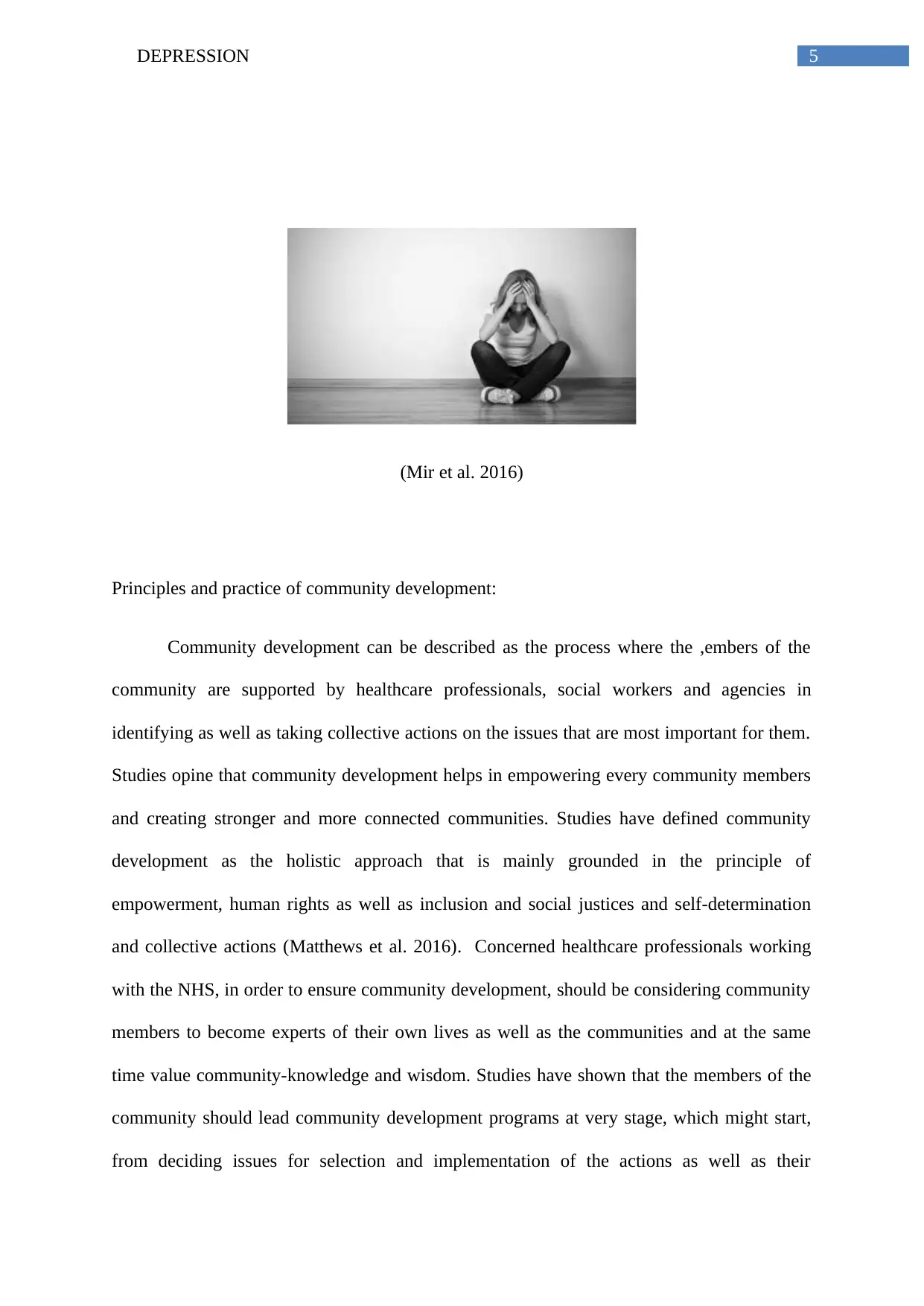
5DEPRESSION
(Mir et al. 2016)
Principles and practice of community development:
Community development can be described as the process where the ,embers of the
community are supported by healthcare professionals, social workers and agencies in
identifying as well as taking collective actions on the issues that are most important for them.
Studies opine that community development helps in empowering every community members
and creating stronger and more connected communities. Studies have defined community
development as the holistic approach that is mainly grounded in the principle of
empowerment, human rights as well as inclusion and social justices and self-determination
and collective actions (Matthews et al. 2016). Concerned healthcare professionals working
with the NHS, in order to ensure community development, should be considering community
members to become experts of their own lives as well as the communities and at the same
time value community-knowledge and wisdom. Studies have shown that the members of the
community should lead community development programs at very stage, which might start,
from deciding issues for selection and implementation of the actions as well as their
(Mir et al. 2016)
Principles and practice of community development:
Community development can be described as the process where the ,embers of the
community are supported by healthcare professionals, social workers and agencies in
identifying as well as taking collective actions on the issues that are most important for them.
Studies opine that community development helps in empowering every community members
and creating stronger and more connected communities. Studies have defined community
development as the holistic approach that is mainly grounded in the principle of
empowerment, human rights as well as inclusion and social justices and self-determination
and collective actions (Matthews et al. 2016). Concerned healthcare professionals working
with the NHS, in order to ensure community development, should be considering community
members to become experts of their own lives as well as the communities and at the same
time value community-knowledge and wisdom. Studies have shown that the members of the
community should lead community development programs at very stage, which might start,
from deciding issues for selection and implementation of the actions as well as their
⊘ This is a preview!⊘
Do you want full access?
Subscribe today to unlock all pages.

Trusted by 1+ million students worldwide
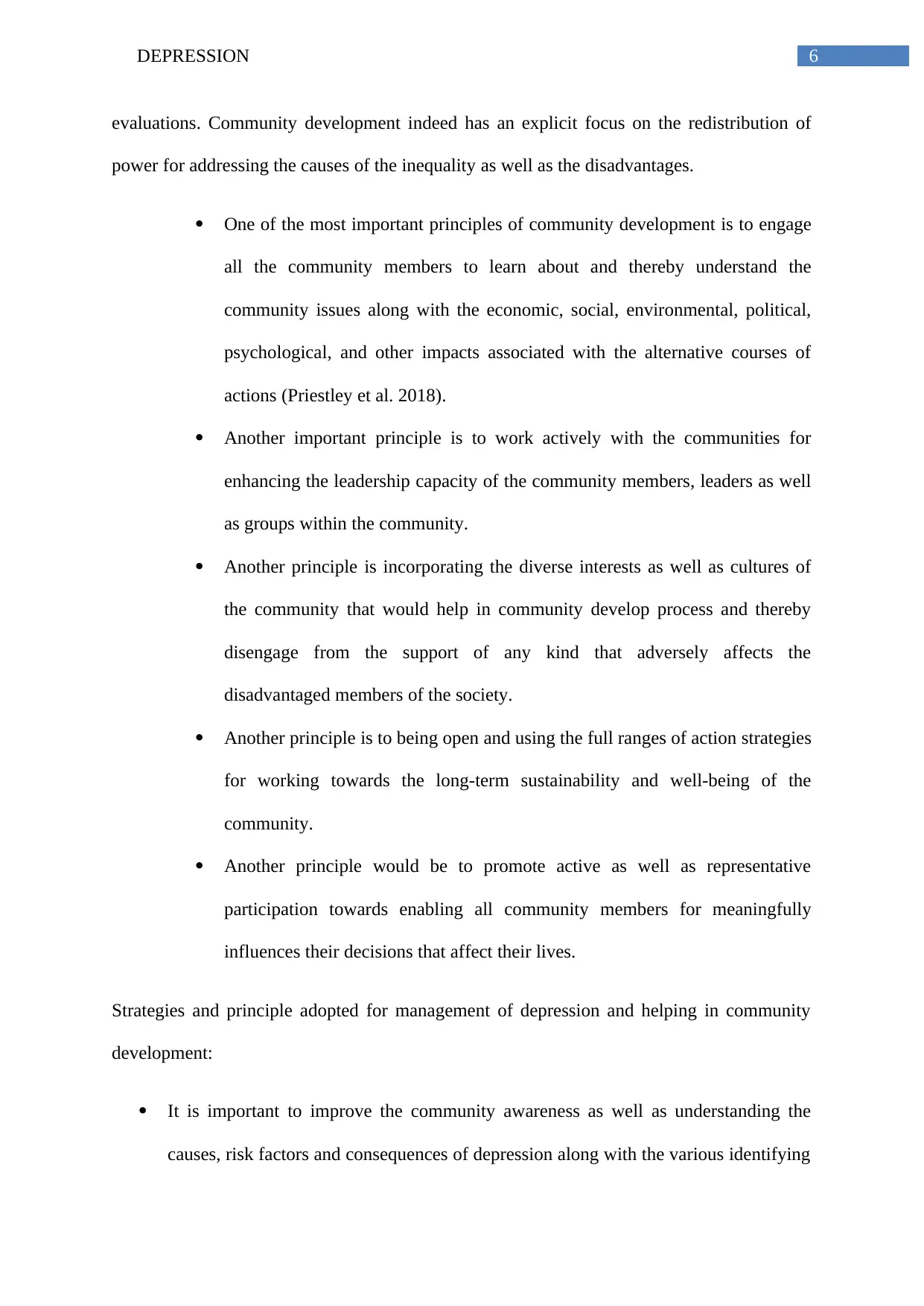
6DEPRESSION
evaluations. Community development indeed has an explicit focus on the redistribution of
power for addressing the causes of the inequality as well as the disadvantages.
One of the most important principles of community development is to engage
all the community members to learn about and thereby understand the
community issues along with the economic, social, environmental, political,
psychological, and other impacts associated with the alternative courses of
actions (Priestley et al. 2018).
Another important principle is to work actively with the communities for
enhancing the leadership capacity of the community members, leaders as well
as groups within the community.
Another principle is incorporating the diverse interests as well as cultures of
the community that would help in community develop process and thereby
disengage from the support of any kind that adversely affects the
disadvantaged members of the society.
Another principle is to being open and using the full ranges of action strategies
for working towards the long-term sustainability and well-being of the
community.
Another principle would be to promote active as well as representative
participation towards enabling all community members for meaningfully
influences their decisions that affect their lives.
Strategies and principle adopted for management of depression and helping in community
development:
It is important to improve the community awareness as well as understanding the
causes, risk factors and consequences of depression along with the various identifying
evaluations. Community development indeed has an explicit focus on the redistribution of
power for addressing the causes of the inequality as well as the disadvantages.
One of the most important principles of community development is to engage
all the community members to learn about and thereby understand the
community issues along with the economic, social, environmental, political,
psychological, and other impacts associated with the alternative courses of
actions (Priestley et al. 2018).
Another important principle is to work actively with the communities for
enhancing the leadership capacity of the community members, leaders as well
as groups within the community.
Another principle is incorporating the diverse interests as well as cultures of
the community that would help in community develop process and thereby
disengage from the support of any kind that adversely affects the
disadvantaged members of the society.
Another principle is to being open and using the full ranges of action strategies
for working towards the long-term sustainability and well-being of the
community.
Another principle would be to promote active as well as representative
participation towards enabling all community members for meaningfully
influences their decisions that affect their lives.
Strategies and principle adopted for management of depression and helping in community
development:
It is important to improve the community awareness as well as understanding the
causes, risk factors and consequences of depression along with the various identifying
Paraphrase This Document
Need a fresh take? Get an instant paraphrase of this document with our AI Paraphraser
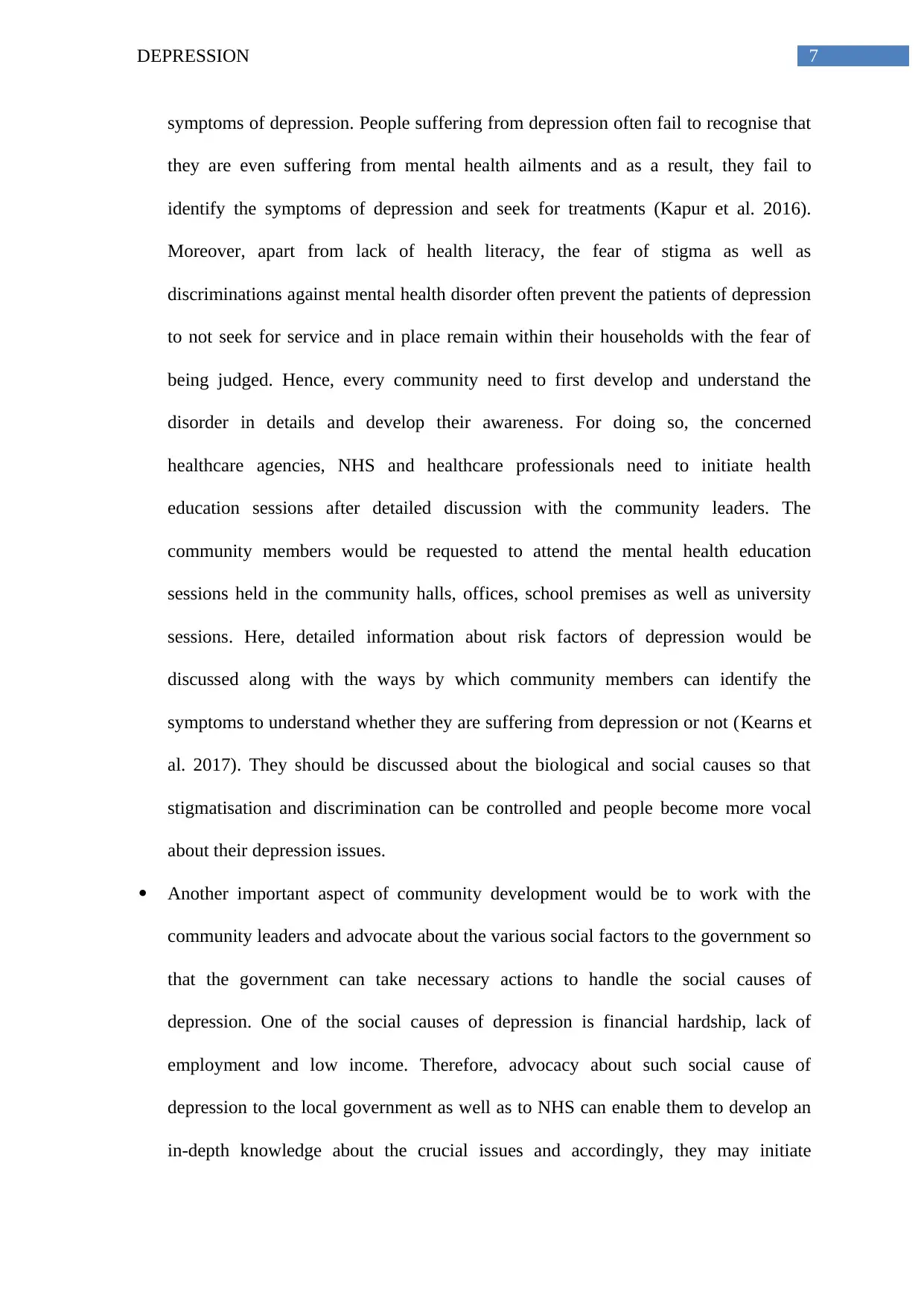
7DEPRESSION
symptoms of depression. People suffering from depression often fail to recognise that
they are even suffering from mental health ailments and as a result, they fail to
identify the symptoms of depression and seek for treatments (Kapur et al. 2016).
Moreover, apart from lack of health literacy, the fear of stigma as well as
discriminations against mental health disorder often prevent the patients of depression
to not seek for service and in place remain within their households with the fear of
being judged. Hence, every community need to first develop and understand the
disorder in details and develop their awareness. For doing so, the concerned
healthcare agencies, NHS and healthcare professionals need to initiate health
education sessions after detailed discussion with the community leaders. The
community members would be requested to attend the mental health education
sessions held in the community halls, offices, school premises as well as university
sessions. Here, detailed information about risk factors of depression would be
discussed along with the ways by which community members can identify the
symptoms to understand whether they are suffering from depression or not (Kearns et
al. 2017). They should be discussed about the biological and social causes so that
stigmatisation and discrimination can be controlled and people become more vocal
about their depression issues.
Another important aspect of community development would be to work with the
community leaders and advocate about the various social factors to the government so
that the government can take necessary actions to handle the social causes of
depression. One of the social causes of depression is financial hardship, lack of
employment and low income. Therefore, advocacy about such social cause of
depression to the local government as well as to NHS can enable them to develop an
in-depth knowledge about the crucial issues and accordingly, they may initiate
symptoms of depression. People suffering from depression often fail to recognise that
they are even suffering from mental health ailments and as a result, they fail to
identify the symptoms of depression and seek for treatments (Kapur et al. 2016).
Moreover, apart from lack of health literacy, the fear of stigma as well as
discriminations against mental health disorder often prevent the patients of depression
to not seek for service and in place remain within their households with the fear of
being judged. Hence, every community need to first develop and understand the
disorder in details and develop their awareness. For doing so, the concerned
healthcare agencies, NHS and healthcare professionals need to initiate health
education sessions after detailed discussion with the community leaders. The
community members would be requested to attend the mental health education
sessions held in the community halls, offices, school premises as well as university
sessions. Here, detailed information about risk factors of depression would be
discussed along with the ways by which community members can identify the
symptoms to understand whether they are suffering from depression or not (Kearns et
al. 2017). They should be discussed about the biological and social causes so that
stigmatisation and discrimination can be controlled and people become more vocal
about their depression issues.
Another important aspect of community development would be to work with the
community leaders and advocate about the various social factors to the government so
that the government can take necessary actions to handle the social causes of
depression. One of the social causes of depression is financial hardship, lack of
employment and low income. Therefore, advocacy about such social cause of
depression to the local government as well as to NHS can enable them to develop an
in-depth knowledge about the crucial issues and accordingly, they may initiate
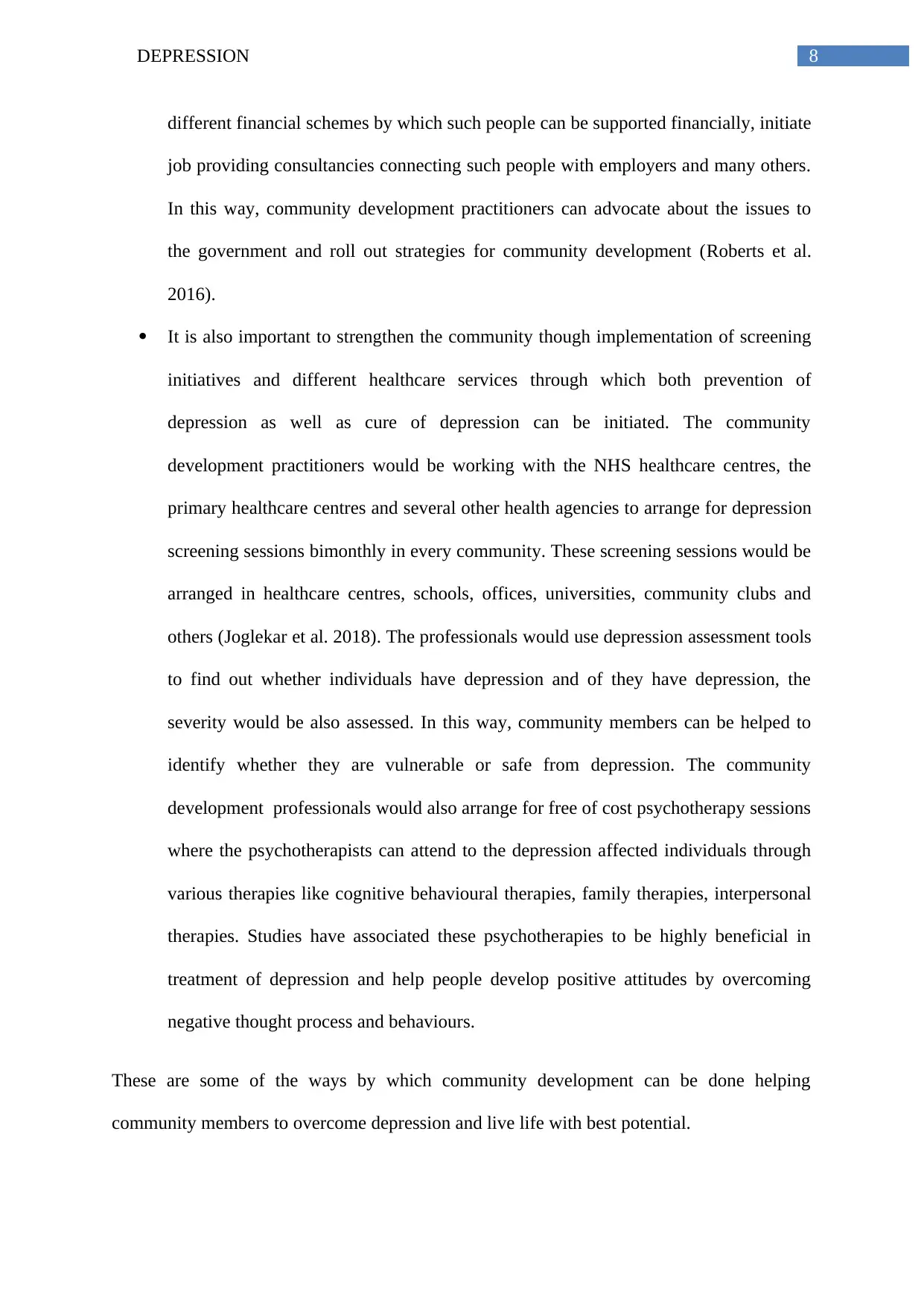
8DEPRESSION
different financial schemes by which such people can be supported financially, initiate
job providing consultancies connecting such people with employers and many others.
In this way, community development practitioners can advocate about the issues to
the government and roll out strategies for community development (Roberts et al.
2016).
It is also important to strengthen the community though implementation of screening
initiatives and different healthcare services through which both prevention of
depression as well as cure of depression can be initiated. The community
development practitioners would be working with the NHS healthcare centres, the
primary healthcare centres and several other health agencies to arrange for depression
screening sessions bimonthly in every community. These screening sessions would be
arranged in healthcare centres, schools, offices, universities, community clubs and
others (Joglekar et al. 2018). The professionals would use depression assessment tools
to find out whether individuals have depression and of they have depression, the
severity would be also assessed. In this way, community members can be helped to
identify whether they are vulnerable or safe from depression. The community
development professionals would also arrange for free of cost psychotherapy sessions
where the psychotherapists can attend to the depression affected individuals through
various therapies like cognitive behavioural therapies, family therapies, interpersonal
therapies. Studies have associated these psychotherapies to be highly beneficial in
treatment of depression and help people develop positive attitudes by overcoming
negative thought process and behaviours.
These are some of the ways by which community development can be done helping
community members to overcome depression and live life with best potential.
different financial schemes by which such people can be supported financially, initiate
job providing consultancies connecting such people with employers and many others.
In this way, community development practitioners can advocate about the issues to
the government and roll out strategies for community development (Roberts et al.
2016).
It is also important to strengthen the community though implementation of screening
initiatives and different healthcare services through which both prevention of
depression as well as cure of depression can be initiated. The community
development practitioners would be working with the NHS healthcare centres, the
primary healthcare centres and several other health agencies to arrange for depression
screening sessions bimonthly in every community. These screening sessions would be
arranged in healthcare centres, schools, offices, universities, community clubs and
others (Joglekar et al. 2018). The professionals would use depression assessment tools
to find out whether individuals have depression and of they have depression, the
severity would be also assessed. In this way, community members can be helped to
identify whether they are vulnerable or safe from depression. The community
development professionals would also arrange for free of cost psychotherapy sessions
where the psychotherapists can attend to the depression affected individuals through
various therapies like cognitive behavioural therapies, family therapies, interpersonal
therapies. Studies have associated these psychotherapies to be highly beneficial in
treatment of depression and help people develop positive attitudes by overcoming
negative thought process and behaviours.
These are some of the ways by which community development can be done helping
community members to overcome depression and live life with best potential.
⊘ This is a preview!⊘
Do you want full access?
Subscribe today to unlock all pages.

Trusted by 1+ million students worldwide
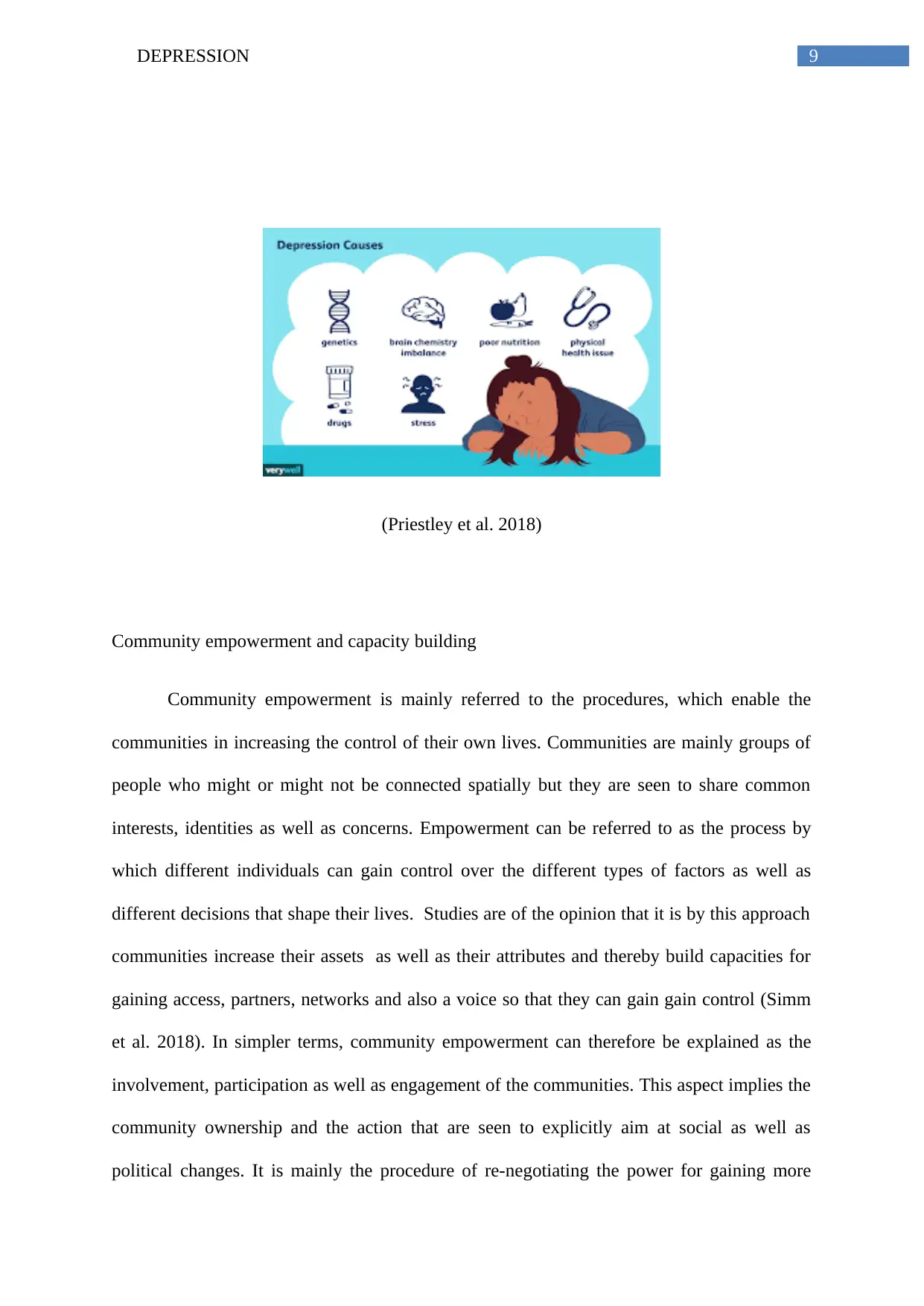
9DEPRESSION
(Priestley et al. 2018)
Community empowerment and capacity building
Community empowerment is mainly referred to the procedures, which enable the
communities in increasing the control of their own lives. Communities are mainly groups of
people who might or might not be connected spatially but they are seen to share common
interests, identities as well as concerns. Empowerment can be referred to as the process by
which different individuals can gain control over the different types of factors as well as
different decisions that shape their lives. Studies are of the opinion that it is by this approach
communities increase their assets as well as their attributes and thereby build capacities for
gaining access, partners, networks and also a voice so that they can gain gain control (Simm
et al. 2018). In simpler terms, community empowerment can therefore be explained as the
involvement, participation as well as engagement of the communities. This aspect implies the
community ownership and the action that are seen to explicitly aim at social as well as
political changes. It is mainly the procedure of re-negotiating the power for gaining more
(Priestley et al. 2018)
Community empowerment and capacity building
Community empowerment is mainly referred to the procedures, which enable the
communities in increasing the control of their own lives. Communities are mainly groups of
people who might or might not be connected spatially but they are seen to share common
interests, identities as well as concerns. Empowerment can be referred to as the process by
which different individuals can gain control over the different types of factors as well as
different decisions that shape their lives. Studies are of the opinion that it is by this approach
communities increase their assets as well as their attributes and thereby build capacities for
gaining access, partners, networks and also a voice so that they can gain gain control (Simm
et al. 2018). In simpler terms, community empowerment can therefore be explained as the
involvement, participation as well as engagement of the communities. This aspect implies the
community ownership and the action that are seen to explicitly aim at social as well as
political changes. It is mainly the procedure of re-negotiating the power for gaining more
Paraphrase This Document
Need a fresh take? Get an instant paraphrase of this document with our AI Paraphraser
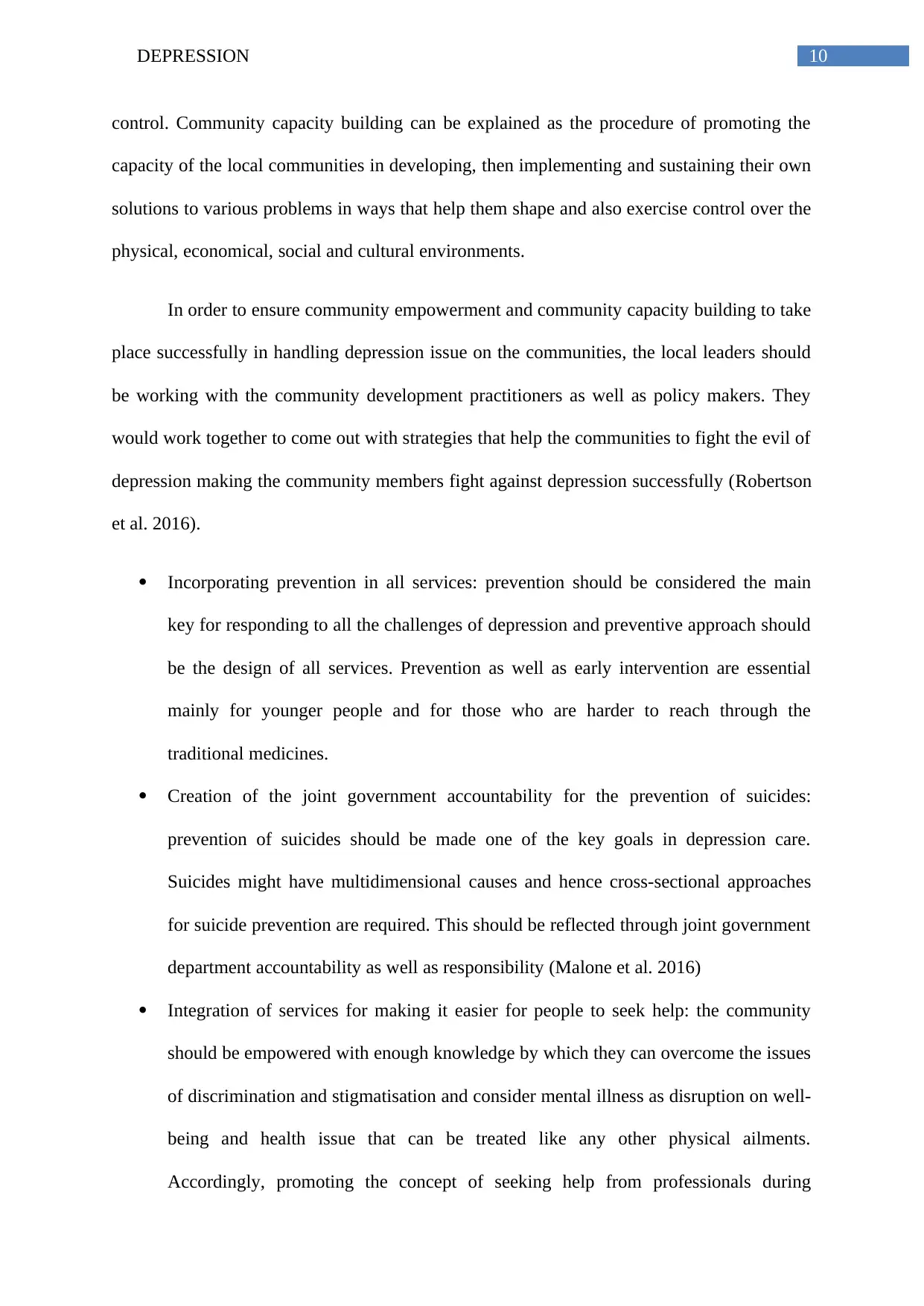
10DEPRESSION
control. Community capacity building can be explained as the procedure of promoting the
capacity of the local communities in developing, then implementing and sustaining their own
solutions to various problems in ways that help them shape and also exercise control over the
physical, economical, social and cultural environments.
In order to ensure community empowerment and community capacity building to take
place successfully in handling depression issue on the communities, the local leaders should
be working with the community development practitioners as well as policy makers. They
would work together to come out with strategies that help the communities to fight the evil of
depression making the community members fight against depression successfully (Robertson
et al. 2016).
Incorporating prevention in all services: prevention should be considered the main
key for responding to all the challenges of depression and preventive approach should
be the design of all services. Prevention as well as early intervention are essential
mainly for younger people and for those who are harder to reach through the
traditional medicines.
Creation of the joint government accountability for the prevention of suicides:
prevention of suicides should be made one of the key goals in depression care.
Suicides might have multidimensional causes and hence cross-sectional approaches
for suicide prevention are required. This should be reflected through joint government
department accountability as well as responsibility (Malone et al. 2016)
Integration of services for making it easier for people to seek help: the community
should be empowered with enough knowledge by which they can overcome the issues
of discrimination and stigmatisation and consider mental illness as disruption on well-
being and health issue that can be treated like any other physical ailments.
Accordingly, promoting the concept of seeking help from professionals during
control. Community capacity building can be explained as the procedure of promoting the
capacity of the local communities in developing, then implementing and sustaining their own
solutions to various problems in ways that help them shape and also exercise control over the
physical, economical, social and cultural environments.
In order to ensure community empowerment and community capacity building to take
place successfully in handling depression issue on the communities, the local leaders should
be working with the community development practitioners as well as policy makers. They
would work together to come out with strategies that help the communities to fight the evil of
depression making the community members fight against depression successfully (Robertson
et al. 2016).
Incorporating prevention in all services: prevention should be considered the main
key for responding to all the challenges of depression and preventive approach should
be the design of all services. Prevention as well as early intervention are essential
mainly for younger people and for those who are harder to reach through the
traditional medicines.
Creation of the joint government accountability for the prevention of suicides:
prevention of suicides should be made one of the key goals in depression care.
Suicides might have multidimensional causes and hence cross-sectional approaches
for suicide prevention are required. This should be reflected through joint government
department accountability as well as responsibility (Malone et al. 2016)
Integration of services for making it easier for people to seek help: the community
should be empowered with enough knowledge by which they can overcome the issues
of discrimination and stigmatisation and consider mental illness as disruption on well-
being and health issue that can be treated like any other physical ailments.
Accordingly, promoting the concept of seeking help from professionals during
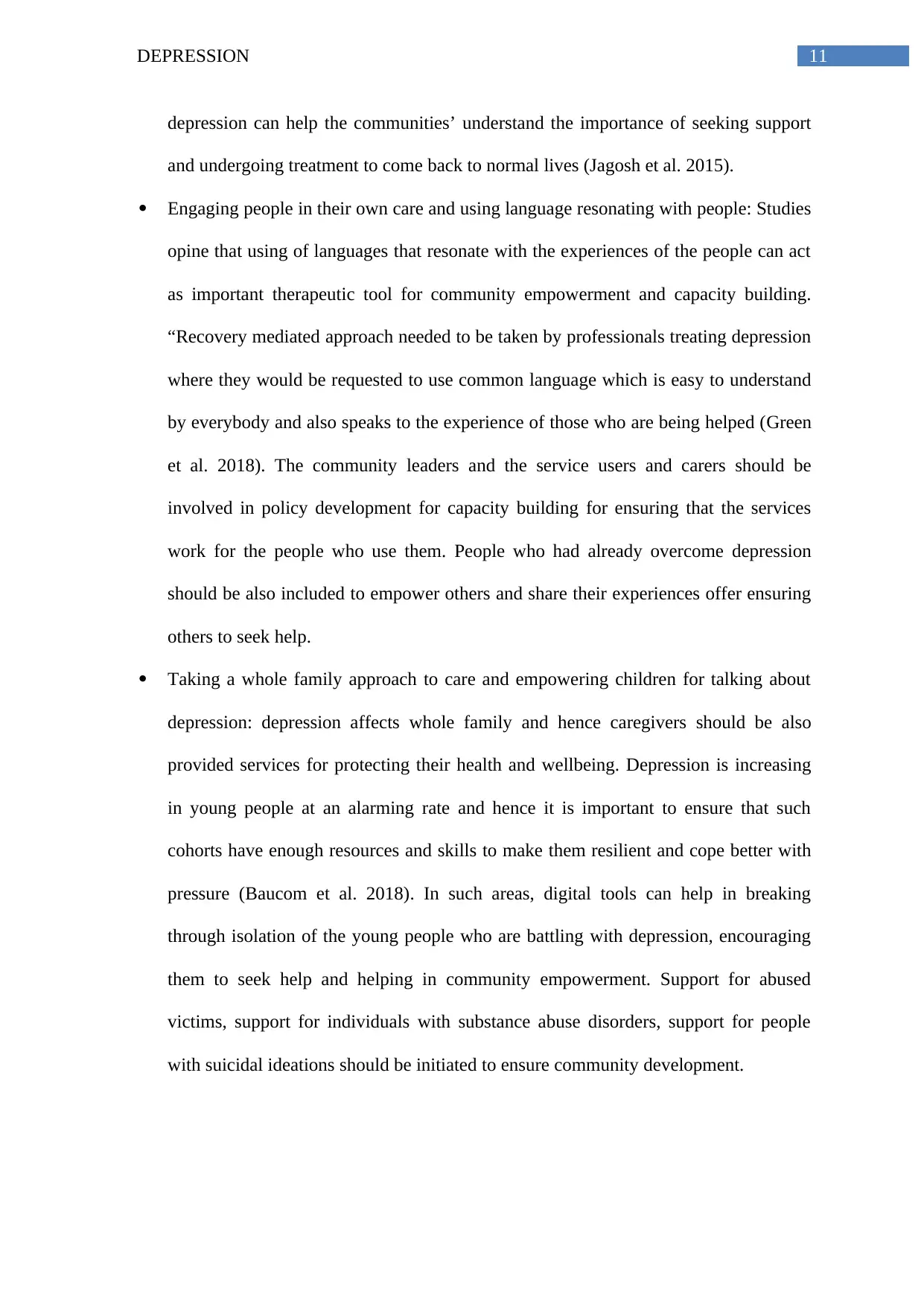
11DEPRESSION
depression can help the communities’ understand the importance of seeking support
and undergoing treatment to come back to normal lives (Jagosh et al. 2015).
Engaging people in their own care and using language resonating with people: Studies
opine that using of languages that resonate with the experiences of the people can act
as important therapeutic tool for community empowerment and capacity building.
“Recovery mediated approach needed to be taken by professionals treating depression
where they would be requested to use common language which is easy to understand
by everybody and also speaks to the experience of those who are being helped (Green
et al. 2018). The community leaders and the service users and carers should be
involved in policy development for capacity building for ensuring that the services
work for the people who use them. People who had already overcome depression
should be also included to empower others and share their experiences offer ensuring
others to seek help.
Taking a whole family approach to care and empowering children for talking about
depression: depression affects whole family and hence caregivers should be also
provided services for protecting their health and wellbeing. Depression is increasing
in young people at an alarming rate and hence it is important to ensure that such
cohorts have enough resources and skills to make them resilient and cope better with
pressure (Baucom et al. 2018). In such areas, digital tools can help in breaking
through isolation of the young people who are battling with depression, encouraging
them to seek help and helping in community empowerment. Support for abused
victims, support for individuals with substance abuse disorders, support for people
with suicidal ideations should be initiated to ensure community development.
depression can help the communities’ understand the importance of seeking support
and undergoing treatment to come back to normal lives (Jagosh et al. 2015).
Engaging people in their own care and using language resonating with people: Studies
opine that using of languages that resonate with the experiences of the people can act
as important therapeutic tool for community empowerment and capacity building.
“Recovery mediated approach needed to be taken by professionals treating depression
where they would be requested to use common language which is easy to understand
by everybody and also speaks to the experience of those who are being helped (Green
et al. 2018). The community leaders and the service users and carers should be
involved in policy development for capacity building for ensuring that the services
work for the people who use them. People who had already overcome depression
should be also included to empower others and share their experiences offer ensuring
others to seek help.
Taking a whole family approach to care and empowering children for talking about
depression: depression affects whole family and hence caregivers should be also
provided services for protecting their health and wellbeing. Depression is increasing
in young people at an alarming rate and hence it is important to ensure that such
cohorts have enough resources and skills to make them resilient and cope better with
pressure (Baucom et al. 2018). In such areas, digital tools can help in breaking
through isolation of the young people who are battling with depression, encouraging
them to seek help and helping in community empowerment. Support for abused
victims, support for individuals with substance abuse disorders, support for people
with suicidal ideations should be initiated to ensure community development.
⊘ This is a preview!⊘
Do you want full access?
Subscribe today to unlock all pages.

Trusted by 1+ million students worldwide
1 out of 19
Related Documents
Your All-in-One AI-Powered Toolkit for Academic Success.
+13062052269
info@desklib.com
Available 24*7 on WhatsApp / Email
![[object Object]](/_next/static/media/star-bottom.7253800d.svg)
Unlock your academic potential
Copyright © 2020–2026 A2Z Services. All Rights Reserved. Developed and managed by ZUCOL.





